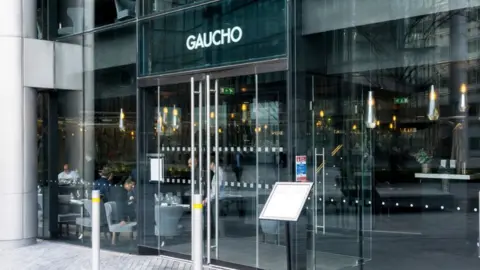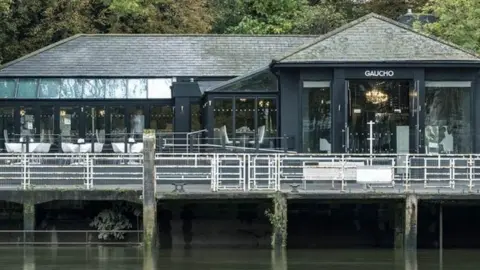Gaucho restaurant group collapses with 1,500 jobs at risk
 Alamy
AlamyAbout 1,500 jobs are at risk after the Gaucho restaurant group said it intended to appoint administrators.
The firm's advisors had been trying to find a buyer for the 39 restaurants in the Gaucho and Cau chains.
However, high debt levels and a complex legal structure meant it had been unable to find an "agreed, solvent solution", a spokesperson said.
The "ongoing underperformance" of Cau, which has been under threat since May, had also been an issue, Gaucho said.
Directors have filed notice of intention to appoint administrators for the business, which is owned by the private equity firm Equistone.
"Until such time as the administrator has been appointed and agreed plans with management, it is business as usual," its statement said.
Cau, described by Equistone as an "aspirational casual dining chain", was launched in 2010 and has 22 restaurants.
Gaucho, which specialises in Argentinean steaks and fine wine, has 12 restaurants in London, with others in Birmingham, Leeds, Manchester, Edinburgh, Dubai and Hong Kong.
 Gaucho
GauchoThey have become the latest restaurant chains to suffer as consumers change their spending patterns.
Prezzo, Jamie's Italian and Byron and Carluccio's are among those that have announced plans to close some outlets this year.
Equistone backed a management buyout of Gaucho in 2005 and the business was sold to private equity firm Phoenix the following year with a return of 2.5 times its original investment.
Equistone then took control of Gaucho again in January 2016.
A spokesperson for Equistone said it had presented Gaucho's lenders with a "business plan that would have maintained the company as a going concern".
It is understood that lenders to Gaucho rejected an Equistone proposal to put the Cau chain into a form of insolvency known as a Company Voluntary Arrangement (CVA), as well as taking on their debt.
That rejection forced Gaucho's directors to put the the company into administration due to the lack of any other funding options.
